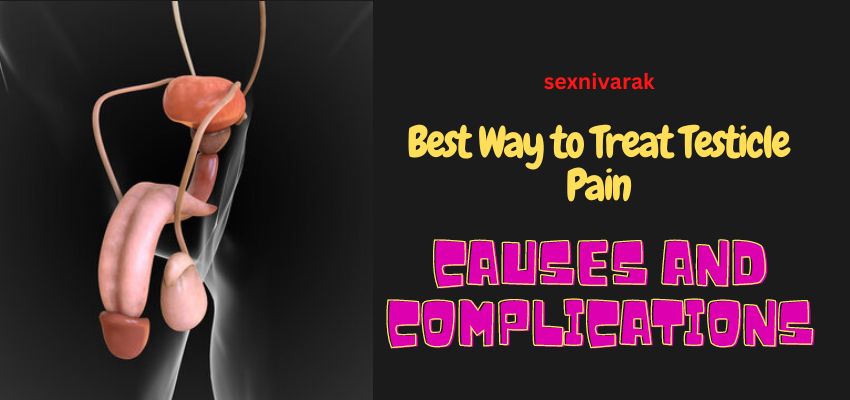Being a Man you must have suffered through Testicle’s pain. Do you have ever think Why Do Testicles Hurt? In this article, you will get to Know the Best Way to Treat Testicle Pain. Testicle pain can be caused by nerve damage, a sexually transmitted infection (STI), gangrene, inflammation, hernia, kidney stones, enlarged veins, fluid accumulation in the testicle, or a serious condition known as testicular torsion.
Testicles are egg-shaped reproductive organs located in the lower part of the penis. Pain in the testicle can be caused by a minor injury to this area, but you also need to evaluate other symptoms.
Scrotal pain can also result from more serious conditions such as testicular torsion or a sexually transmitted infection (STI). Therefore, ignoring this pain can cause permanent damage to the testicle.
When there are testicular problems, pain in the abdomen or groin often develops before the pain in the testicle develops. Therefore unexplored abdominal or back pain should also be evaluated by your doctor.
Best Way to Treat Testicle Pain
Testicle pain that does not require medical attention can be treated at home using the following measures:
- Wear an athletic supporter or L-guard to support the testicle. You can buy it online.
- Use ice to reduce swelling in the testicles.
- Take a bath with warm water.
- Support your testicle by placing a rolled-up towel under it while you lie down.
- Use over-the-counter pain relievers such as acetaminophen or ibuprofen to reduce pain.
In more severe pain, you will need to seek treatment from your doctor. The doctor will physically examine your abdomen, pelvis, and testicles to determine the cause of your pain and will also ask you about your current health conditions and other symptoms.
To make an accurate diagnosis of your condition, your doctor may order additional tests, including:
- an ultrasound, which will give a clear picture of the testicle and its sac
- urine test or semen test to check for viral or bacterial infection
- testing for prostatic secretions, which will require you to undergo a rectal exam
Once the doctor finds out the cause of your pain, he will provide you with the Best Way to Treat Testicle Pain accordingly. Treatment may include:
- antibiotics to treat infection
- surgery to correct testicular torsion
- surgery to potentially correct an undescended testicle
- surgery to decrease fluid accumulation in the testicles
- pain relievers
What are the common causes of testicle pain?
Trauma or injury can cause testicle pain, but it is often the result of another medical problem that needs to be treated. These medical problems include:
- Damage to the nerves of the scrotum due to diabetic neuropathy. Diabetic neuropathy is a type of nerve damage that can cause when you have diabetes. High levels of sugar can injure nerves throughout the body, including the nerves of the testicles.
- Epididymitis, or inflammation of the testicle, is caused by a sexually transmitted infection called chlamydia.
- Gangrene, or death of tissue, can result from trauma to the testicle or untreated testicular torsion.
- Hydrocele, or hydrocele, in which the tissues of the testicle fill with water and swell. This can be due to injury or inflammation in the testicle.
- Inguinal hernia is a condition in which soft tissue, often found in the intestines, bulges through a weak point in the testicle. This resulting bulge can be painful.
- Kidney stone.
- Swelling and pain in the testicle due to bacterial or viral infection.
- Accumulation of fluid in the epididymal duct, where sperm are stored.
- The testicle normally stays in the abdomen instead of descending into the scrotum, which is called a descended testicle.
- A cluster of enlarged veins in the testicle is called a varicocele.
In some cases, testicle pain can be caused by a serious medical condition called testicular torsion. In this condition, the testicle gets twisted, which cuts off the blood supply to it. This can cause tissue damage.
Testicular torsion is a medical emergency that needs to be treated as soon as possible to prevent damage to the testicle. The condition occurs more often in males between the ages of 10 and 20.
Testicular cancer causing pain in the testicle is very rare. Testicular cancer usually causes a lump to form on the testicle, which is often painless.
What are the possible complications of testicle pain?
A doctor can successfully treat most cases of testicular pain.
Left untreated, an infection like chlamydia or a serious condition like testicular torsion can cause permanent damage to your testicle and its sac.
This damage can also affect your fertility.
The testicular torsion that results in gangrene can cause a life-threatening infection that can spread throughout your body.
When should you see a doctor?
See a doctor if you’re experiencing the following symptoms along with testicle pain:
- you feel a lump on your testicle
- you have fever
- your testicle is red and feels warm or tender to the touch
- You have recently been in contact with someone who has mumps. Mumps is a contagious viral disease that causes swelling of the salivary glands of the face and is a risk factor for infertility in adult males.
Contact an emergency medicine doctor immediately if you are experiencing the following symptoms along with testicle pain:
- The pain comes on suddenly and is quite severe
- you feel nauseous and feel like vomiting
- you have an injury to your testicle that is very painful or swells within an hour
How can pain in the testicles be avoided?
Not all cases of testicle pain are preventable, but there are steps you can take to reduce the underlying causes of the pain:
- wearing an L-guard to protect the testicles from injury
- practicing safe sex, such as using condoms
- Checking your testicles once per month to catch changes or lumps early
- completely emptying your bladder when you urinate, to avoid urinary tract infections
If you practice these Best Way to Treat Testicle Pain, immediately consult a doctor and seek proper treatment.


